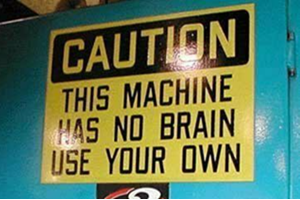Question
I enjoyed reading your book and I enjoy getting your newsletter even though I feel a little out of place because I am in Human Resources. I find your observations about the hiring process to be very accurate. You have a knack for explaining how to phrase certain questions and statements in interviews so that they will come off sounding right. I need your help asking for interview feedback.
When I’ve just been interviewed for a job, I want feedback. Please tell me how to say it to the hiring manager: “How did I do during the interview? What are my prospects for moving forward?”
Nick’s Reply
 Thanks for your kind words. Don’t feel out of place. Many HR folks subscribe to this newsletter, and you’d be surprised how often I’m hired by HR organizations to speak at their meetings. There are many progressive HR practitioners out there!
Thanks for your kind words. Don’t feel out of place. Many HR folks subscribe to this newsletter, and you’d be surprised how often I’m hired by HR organizations to speak at their meetings. There are many progressive HR practitioners out there!
I’m going to try to answer your question with a suggestion that not only gets you the feedback you need, but which can also make you a much stronger candidate.
Candid interview feedback
Getting interview feedback is indeed a bit of an art. But if you stand back from the experience, like a headhunter does, you kinda wonder, Why don’t all managers provide feedback immediately and to all job candidates? Why does anyone have to ask?
I think it’s mainly because interviewers don’t know how to phrase their comments and because they don’t want to appear like they’re making a commitment. They need help with “how to say it” themselves!
Candor is important in business transactions. I think a manager should have a pretty good idea whether a candidate is a likely fit — and should know why — by the end of just one interview. While it may help to interview other candidates before making a decision, it’s healthy for a manager to test their judgment immediately: If this candidate were the only candidate available, would I hire them? Why or why not?
That is the substance of candid, end-of-interview feedback to any candidate.
A manager should share their reaction to your interview right there, on the spot. Here’s how I think you can nudge the information out of them. It involves putting them off balance a bit with a what-if question.
How to Say It
“Thanks for taking time to meet with me. I’ve learned a lot about your operation and I hope you’ve gotten a clear idea of who I am and what I can do for you. Before we part company I’d like to ask you something. What if, instead of a job interview, this had been a project meeting and I was your employee? Would you promote me? Would you give me a raise? Or would you fire me? Based on our meeting, please tell me which you would do. No holds barred — be completely honest with me. Because if I haven’t shown you how I could help your bottom line, then you shouldn’t hire me.”
You should, of course, bend and shape that to suit your own style and needs. Let it sound like you, not me.
Interview feedback: Hire me or fire me?
Please consider this statement carefully: If I haven’t shown you how I’d contribute to your bottom line, then you shouldn’t hire me.
I believe this is also an excellent way to prepare for your interview. If you want to increase your chances of positive feedback, be the candidate that truly deserves it.
Whether or not the manager actually answers you, I think their demeanor will reveal a lot and you’ll know whether to go home and wait for an offer, or move on to another job opportunity where you can be a more compelling candidate.
How do you say it? Prying useful interview feedback from employers is difficult and awkward. Do you have magic words that work? How confident are you about the feedback you’ll get? What other tough questions would you like “How to Say It” advice about?
: :




 I’m going to show you how to stop trying to get a job today, and how to invest in job futures.
I’m going to show you how to stop trying to get a job today, and how to invest in job futures.
 Ever ask a hiring manager for their resume before you agree to a job interview? No? Why not?
Ever ask a hiring manager for their resume before you agree to a job interview? No? Why not?
 “The best way to land a new job is to make new contacts. Hang out with people who do the work you want to do.” Nick, you often write that and it makes me misty for the days when that was possible. [
“The best way to land a new job is to make new contacts. Hang out with people who do the work you want to do.” Nick, you often write that and it makes me misty for the days when that was possible. [
 First, you shouldn’t worry about what any headhunter is interested in. Headhunters are involved in relatively few hires among all jobs that get filled every day. You should be focused instead on conducting your own job search and cultivating good professional contacts. Most hires come from respected sources in your field that know and recommend you.
First, you shouldn’t worry about what any headhunter is interested in. Headhunters are involved in relatively few hires among all jobs that get filled every day. You should be focused instead on conducting your own job search and cultivating good professional contacts. Most hires come from respected sources in your field that know and recommend you.
 All went well. They said they wanted to grow the division to 3X its size under his leadership, and that they would make it worth his while. We were shocked when the offer came through without mention of any incentive plan to meet the ambitious growth objectives that were a cornerstone of their discussions. The offer was just a solid salary and a promise of a “review in 6 months.”
All went well. They said they wanted to grow the division to 3X its size under his leadership, and that they would make it worth his while. We were shocked when the offer came through without mention of any incentive plan to meet the ambitious growth objectives that were a cornerstone of their discussions. The offer was just a solid salary and a promise of a “review in 6 months.”
 “I have to think that no company would subject an applicant to all of this without leaning toward the hire.”
“I have to think that no company would subject an applicant to all of this without leaning toward the hire.”
 So now the recruiters run the asylum? And control who gets hired? Perhaps you should reconsider subjecting your friend to that, and perhaps ask yourself whether you want to continue working for a company whose managers are not involved in selecting their new hires.
So now the recruiters run the asylum? And control who gets hired? Perhaps you should reconsider subjecting your friend to that, and perhaps ask yourself whether you want to continue working for a company whose managers are not involved in selecting their new hires.
 This is the perfect time to negotiate assertively for what you want because employers are dying for good talent. If you’re really good at your work, you have excellent negotiating leverage in the current economy and labor market. I’m glad to hear you got a good salary offer. Now let’s work on that vacation time!
This is the perfect time to negotiate assertively for what you want because employers are dying for good talent. If you’re really good at your work, you have excellent negotiating leverage in the current economy and labor market. I’m glad to hear you got a good salary offer. Now let’s work on that vacation time!
 I’m going to take a stab and read between the lines. You’ve lost lots of candidates you wanted to hire. You interviewed the most recent candidate over a period of three weeks — way too long. Then it seems you took over two weeks to get an offer out to her. My guess is that, in this highly competitive hiring market, you’re way too s-l-o-w… taking way too long to complete a hire.
I’m going to take a stab and read between the lines. You’ve lost lots of candidates you wanted to hire. You interviewed the most recent candidate over a period of three weeks — way too long. Then it seems you took over two weeks to get an offer out to her. My guess is that, in this highly competitive hiring market, you’re way too s-l-o-w… taking way too long to complete a hire.